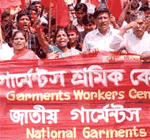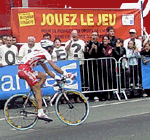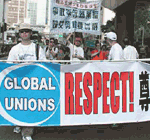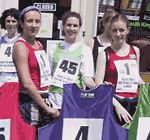Bangkok, Thailand - Sportswear and garment
workers from 7 Asian countries (Cambodia, Philippines, Bangladesh,
Pakistan, Sri Lanka, India, Indonesia) today joined hundreds
of Thai workers in a sport stadium in Bangkok for their own
Olympics. But these games also had a serious message - the
Olympic ideal of fair play should be extended to workers who
make the sportswear so heavily promoted in Athens.
Asia is the world's centre for sportswear production, with
hundreds of thousands of workers, mostly women, employed
under highly exploitative conditions. Junya Yimprasert of
the Thai Labour Campaign said: "Sportswear firms spend
millions of dollars on sponsoring athletes but they squeeze
their suppliers so hard it results in impossible pressures
on workers. “
Thai sportswear worker Sunee said: “Every day sportswear
workers work as hard as any athlete in training. But instead
of medals there are poverty wages, long working hours and
constant pressure to work faster. Today we are competing
for fun, but we are also saying that we object to our working
lives being dominated by competition. Asian workers want
to support each other, not compete.”
The event is part of Play Fair At the Olympics, a campaign
initiative of Oxfams, Global Unions and the Clean Clothes
Campaign which has become one of the biggest ever mobilisations
against exploitative work. Hundreds of organisations, including
the Thai Labour Campaign, have participated in over 35 countries,
more than half a million signatures have been collected
and there have been more than 500 local events. Supporters
include athletes like Spanish cyclist Miguel Indurain and
French World Cup soccer star Didier Deschamps.
The campaign is calling on sportswear brands to change
their buying practices to reduce pressures on suppliers
and workers and on governments to enforce global labour
standards. Tim Connor of Oxfam said “The campaign has
at least succeeded in bringing some major brands in the
sportswear industry, including Nike, adidas, Reebok and
Puma around the table to discuss how to bring an end to
labour abuses. Unfortunately the IOC is refusing either
to take any moral leadership on the issue or to take responsibility
for workers’ rights in Olympic sponsorship and licensing
programs”.
Medals were presented by Marjorie Larney from the 1952
and 1956 US Olympic teams who has helped coach the Thai
Olympic team. Marjorie said “I agree with the goals
of the Day 110%.”
This is the first “Workers’ Olympics” since
World War II and the first ever in Asia. The garment and
sportswear workers will spend the next two days sharing
their stories of factory life and planning further campaign
activity for decent wages and conditions.
For further comment call Junya Yimprasert (Lek) from the
Thai Labour Campaign on 66 (0) 16175491 or Tim Connor from
Oxfam on 66 (0) 60546930.
For more information see www.fairolympics.org
and www.thailabour.org.




